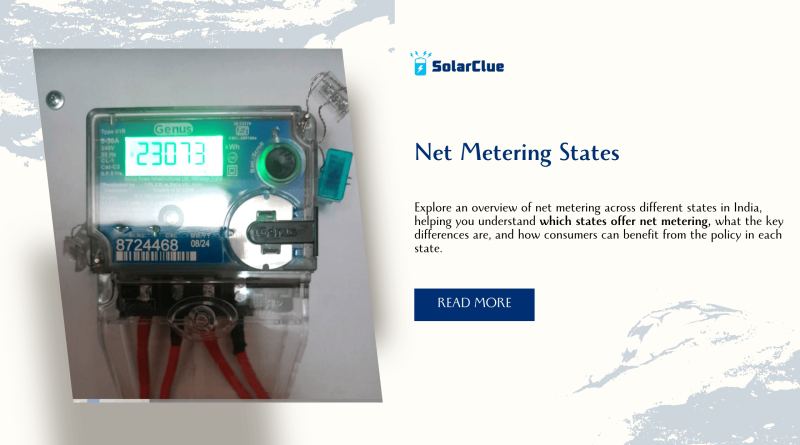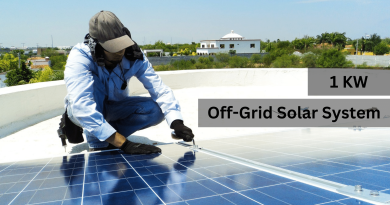Net Metering States
India, with its abundant sunshine and growing focus on renewable energy, has been rapidly adopting solar power solutions. One of the most popular policies driving this change is Net Metering, a system that allows consumers to generate their own electricity (typically through rooftop solar panels) and offset their electricity bills by exporting excess power back to the grid. However, net metering regulations vary across states, with each state implementing its own policies, capacities, and tariffs.
In this blog, we’ll provide an overview of net metering across different states in India, helping you understand which states offer net metering, what the key differences are, and how consumers can benefit from the policy in each state.
Table of Contents
What is Net Metering?
Net Metering is a billing mechanism that allows consumers to generate electricity using solar panels and feed the excess energy back to the grid. Consumers are credited for the energy exported to the grid, which can be used to offset future electricity consumption. The consumer is billed only for the “net” energy consumed, which is the difference between the electricity imported from the grid and the electricity exported.
Net metering policies vary from state to state, with differences in system size limits, tariff rates, and connection guidelines. Understanding the specific rules in each state is important for consumers looking to install solar rooftop systems.
State-wise Net Metering Policies in India
1. Delhi
Delhi’s net metering policy is highly supportive of residential, commercial, and industrial solar installations. Consumers can install solar systems up to 1 MW and earn credits for excess electricity exported to the grid. The Delhi Electricity Regulatory Commission (DERC) manages the net metering policy, which allows consumers to offset their electricity bills with the energy generated.
- System Size: Up to 1 MW
- Eligible Consumers: Residential, Commercial, Industrial
- Carryover Period: 1 year
2. Maharashtra
Maharashtra is another state with a strong solar policy. The Maharashtra Electricity Regulatory Commission (MERC) allows consumers to install rooftop solar systems ranging from 1 kW to 1 MW under net metering. Both residential and commercial consumers can benefit from the policy, which offers credits for the electricity exported to the grid.
- System Size: 1 kW to 1 MW
- Eligible Consumers: Residential, Commercial, Industrial
- Carryover Period: 1 year
3. Tamil Nadu
Tamil Nadu’s net metering policy has undergone several revisions. While earlier policies limited the size of rooftop solar systems, the current guidelines allow residential consumers to install solar systems up to 1 MW. However, Tamil Nadu primarily follows gross metering for commercial and industrial consumers, where all generated power is exported to the grid.
- System Size: Up to 1 MW for residential consumers
- Eligible Consumers: Residential, Commercial (gross metering)
- Carryover Period: Monthly settlement for residential consumers
4. Karnataka
Karnataka has been a pioneer in promoting solar energy, with a favorable net metering policy for consumers. The Karnataka Electricity Regulatory Commission (KERC) allows consumers to install solar systems with capacities between 1 kW to 1 MW. Any excess energy exported to the grid is credited, and the credits are carried forward to future billing cycles.
- System Size: 1 kW to 1 MW
- Eligible Consumers: Residential, Commercial, Industrial
- Carryover Period: 1 year
5. Gujarat
Gujarat’s solar policies have made it one of the leading states in renewable energy generation. The Gujarat Electricity Regulatory Commission (GERC) has implemented a net metering policy that allows consumers to install solar systems up to 1 MW. Both residential and commercial consumers can benefit from the system, and excess energy is credited against future bills.
- System Size: Up to 1 MW
- Eligible Consumers: Residential, Commercial, Industrial
- Carryover Period: 1 year
6. Rajasthan
Rajasthan, one of India’s sunniest states, has embraced solar energy with a progressive net metering policy. The Rajasthan Electricity Regulatory Commission (RERC) allows consumers to install solar systems up to 1 MW. The state encourages residential, commercial, and industrial consumers to adopt solar energy by offering credits for excess power exported to the grid.
- System Size: Up to 1 MW
- Eligible Consumers: Residential, Commercial, Industrial
- Carryover Period: 1 year
7. Haryana
Haryana has a robust net metering policy, allowing consumers to install rooftop solar systems up to 2 MW. Both residential and commercial consumers can take advantage of this policy, and excess energy is credited to their accounts. The policy aims to reduce dependency on grid power and promote renewable energy in the state.
- System Size: Up to 2 MW
- Eligible Consumers: Residential, Commercial, Industrial
- Carryover Period: 1 year
8. Punjab
Punjab has one of the most consumer-friendly net metering policies, allowing system sizes ranging from 1 kW to 1 MW. The policy applies to residential, commercial, and industrial consumers, and excess electricity is credited for future use. The Punjab State Power Corporation Limited (PSPCL) manages the net metering applications.
- System Size: 1 kW to 1 MW
- Eligible Consumers: Residential, Commercial, Industrial
- Carryover Period: 1 year
9. West Bengal
West Bengal’s net metering policy is administered by the West Bengal Electricity Regulatory Commission (WBERC). Consumers can install solar systems ranging from 1 kW to 2 MW, with excess energy credited to their account. This policy covers residential, commercial, and industrial consumers, encouraging the use of rooftop solar systems.
- System Size: 1 kW to 2 MW
- Eligible Consumers: Residential, Commercial, Industrial
- Carryover Period: 1 year
10. Uttar Pradesh
The Uttar Pradesh Electricity Regulatory Commission (UPERC) oversees net metering in the state, allowing consumers to install solar systems with capacities between 1 kW to 2 MW. This policy applies to residential, commercial, and industrial consumers, and excess energy exported to the grid earns credits.
- System Size: 1 kW to 2 MW
- Eligible Consumers: Residential, Commercial, Industrial
- Carryover Period: 1 year
State-wise Net Metering Policies
| State | System Size | Eligible Consumers | Carryover Period |
|---|---|---|---|
| Delhi | Up to 1 MW | Residential, Commercial | 1 year |
| Maharashtra | 1 kW to 1 MW | Residential, Commercial | 1 year |
| Tamil Nadu | Up to 1 MW (residential) | Residential, Commercial (gross) | Monthly (residential) |
| Karnataka | 1 kW to 1 MW | Residential, Commercial | 1 year |
| Gujarat | Up to 1 MW | Residential, Commercial | 1 year |
| Rajasthan | Up to 1 MW | Residential, Commercial | 1 year |
| Haryana | Up to 2 MW | Residential, Commercial | 1 year |
| Punjab | 1 kW to 1 MW | Residential, Commercial | 1 year |
| West Bengal | 1 kW to 2 MW | Residential, Commercial | 1 year |
| Uttar Pradesh | 1 kW to 2 MW | Residential, Commercial | 1 year |
Key Considerations for Net Metering in Different States
While the net metering policies across different states have many similarities, there are a few key factors that consumers should consider:
1. System Size Limits
Each state has set limits on the size of solar rooftop systems that can be connected to the grid under the net metering policy. The system size typically ranges from 1 kW to 1 MW, but states like Haryana and Uttar Pradesh allow systems up to 2 MW.
2. Carryover of Energy Credits
Most states allow consumers to carry forward their energy credits for up to one year. However, some states may settle the credits monthly or annually, so it’s essential to understand your state’s specific guidelines.
3. State Incentives and Subsidies
In addition to net metering, several states offer additional incentives and subsidies for installing rooftop solar systems. Consumers should explore these incentives to reduce the upfront cost of their solar installations.
Conclusion
India’s net metering policy has been a driving force behind the growth of rooftop solar installations across the country. While the specifics of the policy vary from state to state, net metering offers significant financial and environmental benefits, making it easier for consumers to generate their own clean energy and reduce their electricity bills.
Before installing a solar system, it’s important to check your state’s net metering policy, understand the system size limits, and explore any available subsidies. With supportive government policies and the decreasing cost of solar technology, now is a great time to invest in rooftop solar energy.
Ready to Save on Electricity Bills with Solar Power?
With Net Metering, you can drastically reduce your electricity costs by generating your own solar power and sending any excess back to the grid. It’s time to harness the sun’s energy and make a positive impact on both your wallet and the environment!
At SolarClue, we make the transition to solar simple, efficient, and affordable. Whether you’re a homeowner, business, or institution, our team of solar experts will guide you through the process—from installation to maintenance—so you can start saving from day one.
🌞 Take the first step towards energy independence today!
🔋 Get your solar consultation now!
Contact SolarClue or call us at +91-888-4444-830 to explore the best solar solutions for your home or business.
Go Solar. Save More. Power Your Future with SolarClue!
FAQs
1. Is net metering available in all Indian states?
Net metering is available in most Indian states, but the specific regulations and system size limits vary. Consumers should check with their state’s regulatory authority for the latest guidelines.
2. How does net metering reduce electricity bills?
Net metering allows consumers to generate their own electricity and send excess energy back to the grid, earning credits that reduce future electricity bills.
3. What is the maximum size of a rooftop solar system I can install under net metering?
The maximum system size varies by state, ranging from 1 kW to 2 MW, depending on the state’s net metering policy.
4. Can I carry forward unused energy credits?
Yes, most states allow consumers to carry forward unused energy credits for up to one year, which can be applied to future electricity bills.
5. Are there any government incentives for installing rooftop solar systems?
Yes, in addition to net metering, the central and state governments offer various incentives and subsidies to promote solar energy installations.




